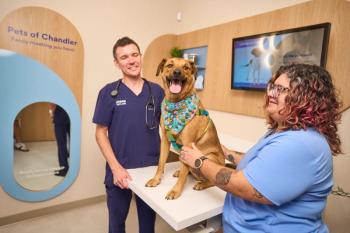
Is an ultrasound machine a 'sound' investment for your practice?
You'd probably like to own an ultrasound machine, but before spending your hard-earned money, take time to determine whether you really need and will use one. "Ultrasound is to soft tissues what radiographs are to the bone, and we certainly see more soft tissue injuries than we do bone injuries," says Dr. Tracy Turner, Professor of Large Animal Surgery at the University of Minnesota in St. Paul, Minn. "You can't live without an ultrasound machine if you do lots of reproduction and lameness work. And it's also useful for visualizing the heart, lungs, pleural cavity, intestines, and other internal organs."
By Sarah A. Chadwick, associate editor
You'd probably like to own an ultrasound machine, but before spending your hard-earned money, take time to determine whether you really need and will use one. "Ultrasound is to soft tissues what radiographs are to the bone, and we certainly see more soft tissue injuries than we do bone injuries," says Dr. Tracy Turner, Professor of Large Animal Surgery at the University of Minnesota in St. Paul, Minn. "You can't live without an ultrasound machine if you do lots of reproduction and lameness work. And it's also useful for visualizing the heart, lungs, pleural cavity, intestines, and other internal organs."
However, if you rarely get to do more than administer vaccinations, deworm horses, and perform dentistry, you may find little use for an ultrasound machine. So ask yourself, Will I use the machine enough to pay for it? Do I handle reproductive or lameness work?
"Next, you must think beyond the initial purchase," Dr. Turner says. Answer these questions to gauge your level of commitment:
1. Are you willing to learn how to use the machine and interpret its results? It takes time and practice to become familiar with the machine, learn to get good images, and recognize what you see.
2. Are you willing to use the machine? Don't buy it if you won't use it and charge clients for the service.
3. Are you willing to seek help if you're unsure about the results you see? You'll need feedback to continue learning.
February 2001 Veterinary Economics
Newsletter
From exam room tips to practice management insights, get trusted veterinary news delivered straight to your inbox—subscribe to dvm360.





